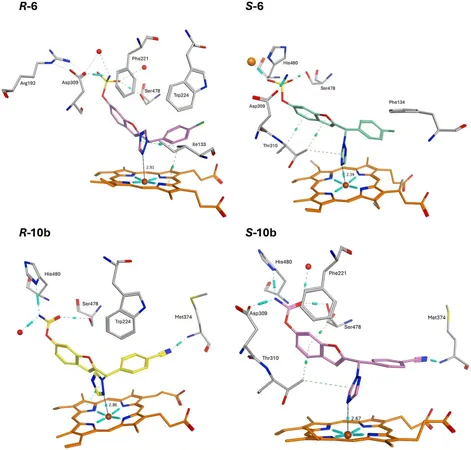
Breakthrough Compounds Take Dual Aim at Hormone-Resistant Breast Cancer
2025-04-09
Author: Daniel
Innovative Approach to Treating ER+ Breast Cancer
In a groundbreaking study, scientists have unveiled novel compounds that promise to revolutionize the treatment of hormone-resistant breast cancer, a condition afflicting countless women worldwide.
Targeting Two Key Enzymes for Better Results
Published in the respected journal RSC Medicinal Chemistry, this groundbreaking research zeroes in on two vital enzymes—the aromatase and steroid sulfatase—both of which play pivotal roles in estrogen production.
Estrogen receptor-positive (ER+) breast cancer, responsible for nearly 70% of all breast cancer diagnoses, frequently develops resistance to conventional hormone therapies. This study introduces a cutting-edge solution: a dual aromatase-steroid sulfatase inhibitor (DASI), uniquely designed to inhibit both enzymes simultaneously.
A New Hope in Cancer Treatment
Dr. Paul Foster from the University of Birmingham, a key contributor to the study, exclaimed, "This marks an exciting development that could significantly enhance treatment options for the most prevalent form of breast cancer, especially when existing therapies fail."
The promising results indicate that these compounds could drastically lower estrogen levels within cancerous cells, effectively stunting tumor growth and providing a much-needed lifeline to patients.
A Scientific Leap: Chemical Modifications Matter
Notably, previous iterations of these compounds focused on inhibiting just one enzyme at a time. However, this study demonstrates that a mere methyl group modification achieved dual functionality, highlighting that even minor chemical tweaks can lead to substantial gains in biological efficacy.
Looking Ahead: A New Class of Cancer Treatments?
With further development, these innovative compounds could emerge as a vital arsenal for patients battling ER+ breast cancer resistant to traditional hormone therapies. Researchers, including Dr. Claire Simons from the University of Cardiff alongside Dr. Foster, are optimistic that this could usher in a new class of powerful breast cancer treatments.

 Brasil (PT)
Brasil (PT)
 Canada (EN)
Canada (EN)
 Chile (ES)
Chile (ES)
 Česko (CS)
Česko (CS)
 대한민국 (KO)
대한민국 (KO)
 España (ES)
España (ES)
 France (FR)
France (FR)
 Hong Kong (EN)
Hong Kong (EN)
 Italia (IT)
Italia (IT)
 日本 (JA)
日本 (JA)
 Magyarország (HU)
Magyarország (HU)
 Norge (NO)
Norge (NO)
 Polska (PL)
Polska (PL)
 Schweiz (DE)
Schweiz (DE)
 Singapore (EN)
Singapore (EN)
 Sverige (SV)
Sverige (SV)
 Suomi (FI)
Suomi (FI)
 Türkiye (TR)
Türkiye (TR)
 الإمارات العربية المتحدة (AR)
الإمارات العربية المتحدة (AR)